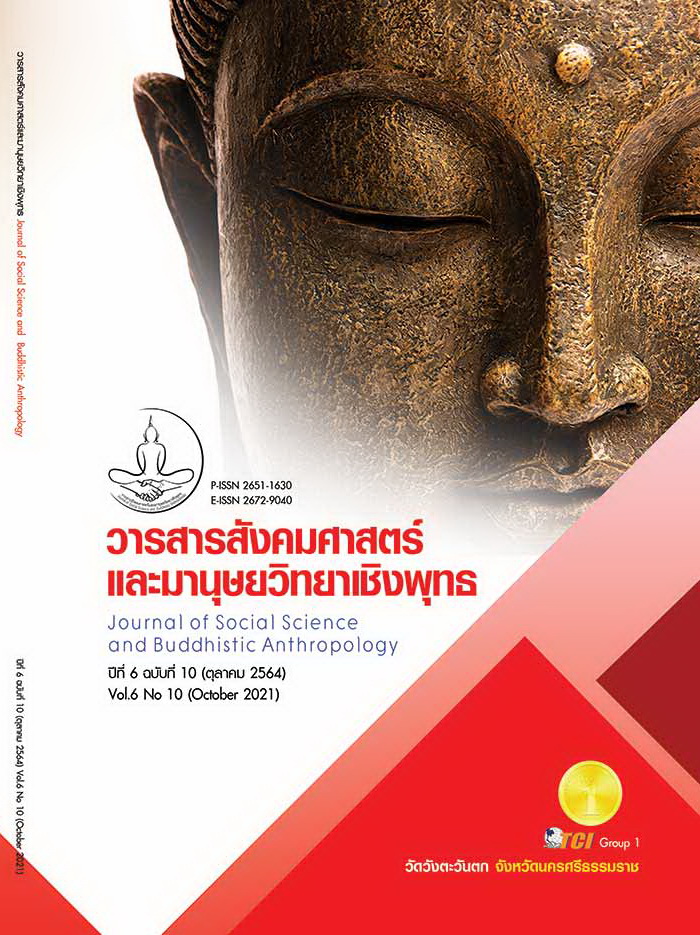THE PHENOMENOLOGY AND THE STUDY OF FAMILY LIFE OF BEING NEW MOTHERS
Keywords:
Phenomenology, the Study of the Family Life, New MothersAbstract
The objectives of this article were to enhance the understanding of two important approaches to phenomenological studies, Phenomenology based on the concept of Edmund Husserl; aiming to describe the meaning created in the consciousness Emphasis on perceptual insights into the structure or essence of the human experience and interpretive phenomenology Martin Heidegger's conceptual study focuses on the interpretation of the subjective person. Emphasis on reaching the meaning of the experience Understanding the importance of status quo. Used as a tool to study the family lifestyle of new mothers. It starts with choosing a relevant paradigm. Selection of contributors, tool use, data collection, and results in analysis from new mothers' experiences, thoughts, feelings, behavior, and self-care from the time of pregnancy to the time of childbearing, child care, as well as from her husband's experiences. Family members and close relatives such as uncles, aunts, grandfathers, grandmothers, contexts, society, beliefs and cultures, village health volunteer, orderly, subdistrict health-promoting hospitals, who take care of new mothers and children. The researcher must understand and extract the body of knowledge in order to interpret. Describing the phenomenon and must take into account the meaning and feelings of the informants who have experienced the incident as necessary It is not the meaning or feeling of the researcher himself. At this point, it is important that the philosophy of phenomenology plays an important role in the study of this method. Extracted as a set of knowledge for raising children for new mothers or transferring to friends, relatives, or people interested in taking care of, behaving, and promoting the child's further development.
References
กัญญ์ฐิตา ศรีภา. (2555). การวิจัยเชิงปรากฎการณ์วิทยาแบบตีความในวิชาชีพพยาบาล. วารสารพยาบาลตำรวจ, 4(2), 16-17.
ชนัญญา ศรีเจริญวณิชย์ และวีณา จีระแพทย์. (2561). ประสบการณ์ชีวิตของมารดาที่ให้นมแม่ในทารกที่ปฏิเสธการดูดเต้า. วารสารพยาบาลทหารบก, 19(1), 158-160.
ชาย โพธิสิตา. (2562). ศาสตร์และศิลป์แห่งการวิจัยเชิงคุณภาพ : คู่มือนักศึกษาและนักวิจัยสังคมศาสตร์. (พิมพ์ครั้งที่ 8). กรุงเทพมหานคร: อมรินทร์พริ้นติ้งแอนด์พับลิชชิ่ง.
ชุดาณัฏฐ์ ขุนเพชร และศศิกานต์ กาละ. (2562). ประสบการณ์ความตั้งใจในการเลี้ยงลูกด้วยนมแม่ของมารดาวัยรุ่นหลังคลอด. วารสารมหาวิทยาลัยนราธิวาสราชนครินทร์, 11( 2), 3-4.
นงนภัส คู่วรัญญู เที่ยงกมล. (2554). การวิจัยเชิงบูรณาการแบบองค์รวม. (พิมพ์ครั้งที่ 2). กรุงเทพมหานคร: จุฬาลงกรณ์มหาวิทยาลัย.
นิศา ชูโต. (2548). การวิจัยเชิงคุณภาพ Qualitative Research. (พิมพ์ครั้งที่ 3). กรุงเทพมหานคร: พริ้นโพร.
ปัญญา เลิศไกร และลัญจกร นิลกาญจน์. (2559). การเก็บข้อมูลวิจัยชุมชนภาคสนาม. วารสารนาคบุตรปริทรรศน์ มหาวิทยาลัยราชภัฏนครศรีธรรมราช, 8(2), 1-10.
พนิดา ศิริอำพันธ์กุล และคณะ. (2558). การเป็นพ่อแม่ที่มีลูกเลี้ยงยากวัยเตาะแตะ. วารสารพยาบาลสาร, 42(2), 72-82.
วารุณี เกตุอินทร์ และคณะ. (2559). การรับรู้สุขภาพและพัฒนาการทารกในมุมมองของมารดาวัยรุ่นครรภ์แรก. วารสารพยาบาลกระทรวงสาธารณสุข, 26(1), 178-181.
ศศิธารา น่วมภา และคณะ. (2563). ประสบการณ์การรับบริการฝากครรภ์และการแสวงหาข้อมูลสุขภาพของสตรีตั้งครรภ์ที่ทำงานในโรงงานอุตสาหกรรมขนาดใหญ่ : การศึกษาเชิงคุณภาพแบบบรรยาย. วารสารพยาบาลศาสตร์, 38(4), 47-49.
ศิริวรรณ ทุมเชื้อ และอัญญา ปลดเปลื้อง. (2558). การพัฒนาโปรแกรมส่งเสริมการเลี้ยงลูกด้วยนมแม่โดยการสนับสนุนของครอบครัว. วารสารศูนย์การศึกษาแพทยศาสตร์คลินิก โรงพยาบาลพระปกเกล้า, 32(1), 6-17.
อารีย์วรรณ อ่วมตานี. (2559). การวิจัยเชิงคุณภาพทางการพยาบาล (QUALITATIVE R ESEARCH IN NURSING). (พิมพ์ครั้งที่ 3). กรุงเทพมหานคร: จุฬาลงกรณ์มหาวิทยาลัย.
Bogdan, R. C. & Biklen, S. K. (2003). Qualitative Research for Education an Introduction to The Theory and Methods. Boston: Allyn and Bacon.
Department of Health. (2020). Thailand Reproductive Health Database. Retrieved December 15, 2020, from http://rhdata.anamai.moph.go.th/
Heidegger, M. (1962). Being and Time (MacQuaeeie J. & Robinson E. trans). New York: Harper & Row.
Koch, T. (1995). Interpretive approaches in nursing research : the influence of Husserl and Heidegger. Journal of Advanced Nursing, 21(5), 827-836.
Leonard, V. W. (1989). A Heideggerian Phenomenologic perspective on the concept of the Person. Advances in Nursing Science, 11(4), 40-55.
Merilyn, A. (1996). Hermeneutic phenomenology : philosophical perspectives and current use in nursing research. Journal of Advanced Nursing, 23(4), 705-713.
Streubert, H. J. & Carpenter D. R. (1995). Qualitative research in nursing: Advancing the humanistic imperative. Philadelphia: PL: J.B.Lippincott.









